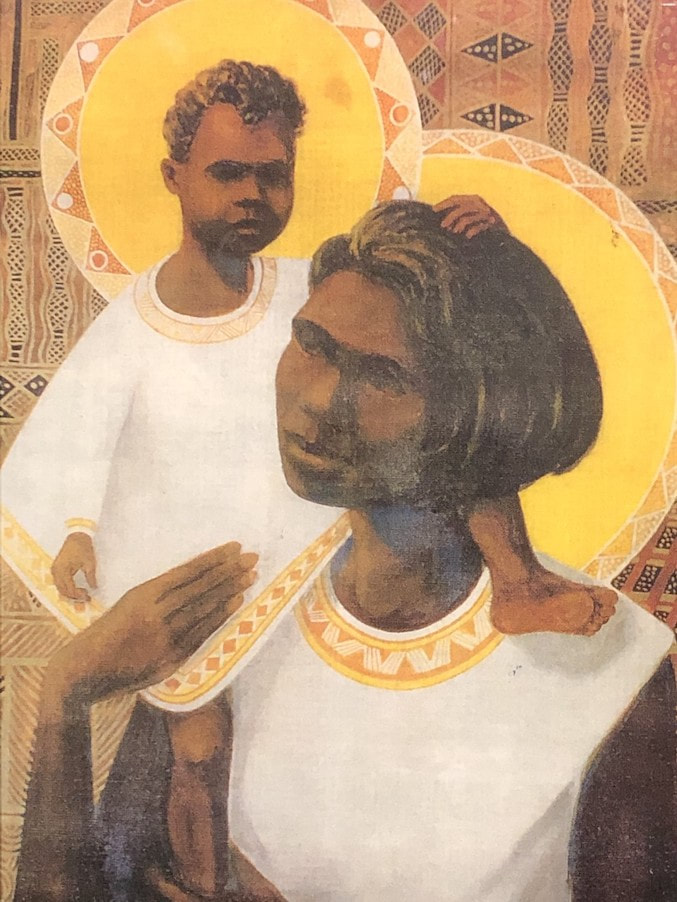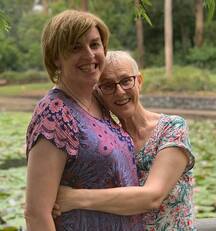our marriage – one of God’s gentle prophetic jokes

As my wife Penny and I approach our 35th wedding anniversary next month, we are increasingly aware of how our marriage has become one of God’s delightful little prophetic jokes to prompt deeper loving awareness.

always asking questions
In truth, even when it originally appeared hetero-normative, our marriage was never straightforward for many. We were not wholly unusual, but, from the first, our shared callings to both priesthood and marriage, and commitment to genuine mutuality, raised questions. Before I entered theological college, I thus vividly remember being asked to read and agree to a document for would-be single students, saying that I would agree not to marry whilst in priestly formation. Well, that was certainly not the divine plan! Penny and I met at our theological college, fell in love, and married between our second and final years there – with kind support for our transgression by our college Principal and the diocese of London (enabling vital continuation, provision of housing and financial assistance). After college, we were then ordained into the first ranks of clergy couples and, just by that new reality, brought to the fore a whole series of fresh issues for the Church and wider community. What shape should a marriage take? What expectations do we have of partners in the relationship, and what significance do we accord to their different characteristics? What, by the way we support such relationships, are we saying about sexuality and equality, gender and identity, love and faith?
Along the way, these have been focused in powerfully contested questions about our roles, housing, pay, and status. Penny for example chose to keep her own surname after marriage – well would you want to be called Penny Inkpin? (albeit we later created our sermons website under the title penandinkreflections as part of God’s joke). However, when, before our ordination, she was asked for her marriage certificate showing any change of name, and she replied that she had not changed her name, I received a letter stating ‘with respect to your request that your wife be ordained in her maiden name, this is not possible’. Eventually a compromise was struck, and her Letters of Orders read, “Penelope Inkpin now known as Penny Jones”! Penny was also, after debates with the diocesan offices, only the second woman in the Church of England to receive paid maternity leave. Like other clergy couples we frequently had to battle with sexist-based assumptions that we only required one stipend, that I (as outwardly the ‘man’ in our marriage) would need a greater place in ministry, and that we had distinctive gifts of ‘complementarity’ to exercise. Being an active part of the struggle for the ordination of women in our early years was also an obvious challenge (as well as full of profound joys). This however was but the leading edge of the transformation of church and society which our marriage represented for others.
transfiguring marriage and the limitations of awareness
Over the last few years our marriage has taken on fresh prophetic significance. Indeed, almost the first thing which hit us after I came out as a transgender woman was the grueling experience of the Australian postal survey on marriage equality. I understand that there were even some who suggested that I was transitioning for the political purpose of forwarding the marriage equality campaign! What a delight it was nonetheless to gather with others in the centre of Canberra (where we were at the time attending a theological conference) to rejoice in the announcement of the resounding ‘yes’ result. We had to wait a little longer than gay people to see full marriage equality for transgender people, as state legislation was slowly changed to remove the shocking ‘forced divorce’ requirement upon a transgender person who transitioned after their wedding. Yet, at last, like our native England, Australian law, and the clear majority of society, had caught up with our own lived reality. Sadly the struggle continues in most church spaces.
Within both Australian Anglicanism and the Church of England, by whose rites Penny and I were legally married, our marriage remains regarded as at least unusual, though we are hardly alone as married couples who include a trangender person. As a married clergy couple in Australia we have certainly once again found ourselves to be pioneers. Indeed, as a same gender married clergy couple in Australia, we are also almost unique. Unlike the wonderful John Davis and Robert Whalley who married in 2019 in Wangaratta diocese, at the time of our wedding, we did not have to challenge the extraordinary same gender marriage phobia which still persists so strongly. They therefore deserve the profound thanks of all sexually and gender diverse people in the Australian Church for breaking the tyrannical bonds of silence and disconnection which are so rarely even contested. Our situation is different, yet also intimately connected. For, as two women together, and still more as two female priests together, we have been legally and canonically married according to Anglican liturgy. We are a living embodiment of what is so officially resisted by the Church of England, and the Anglican Church of Australia: namely the full recognition and blessing of the love of God in and between sexually and gender diverse people. We are in that sense, a sign of hope, an emblematic overturning of ‘what is not possible’, and a kind of joyous divine joke at the Church’s ridiculous and cruel obstinacy. Shockingly however, as with so many other faithful married LGBTIQ Christians, the interminably constipated church debates over our relationships, hardly ever engage with our actual, long and wide, experience of same gender marriage, never mind involve us in deepening awareness of God’s lived realities of love in our lives.
invited to divine laughter
Penny and I never intended our marriage to be prophetic in the manner it has sometimes been. It has to be said of course that there are striking precedents among the biblical prophets for extraordinary intentional actions to symbolise God’s love and intentions for just relationships. Our ‘prophetic witness’ is however, as it has always been, quite unintentional. We have simply sought to respond to the love we have been given, which we have enjoyed in one another, and which has enabled is to share wider love and flourishing with others. For marriage, as we understand it theologically, is a gift of God not only for two individuals, but is also part of the journey of us all towards the full glory of transfiguring love in all of creation. We look forward to the day when our sanctified relationship will not raise eyebrows, or worse, in any quarters. If however it contributes to the breaking down of binaries and boundaries, to the affirmation of our amazing sexually and gender diverse siblings, and and to the fuller liberation of life and love, we say Amen! Like Sarah, who laughed at the supposed impossibility of her new creation, we thereby share in the surprising re-birthing invitation of God.
See further:
my reflections on our marriage journey in relation to the Church:
revealing the rainbow nature of marriage -reflecting on our trans-wedded life together
and
in Christian praise – and unconditional affirmation – of transgender marriage
further theological reflections:
‘A Queer Response to Marriage, Same-Sex Marriage and the Anglican Church of Australia’
(on behalf of Equal Voices, the national network of LGBTIQ+ Christians & allies)
and
Marrying God and all things – beyond bourgeois marriage equality












